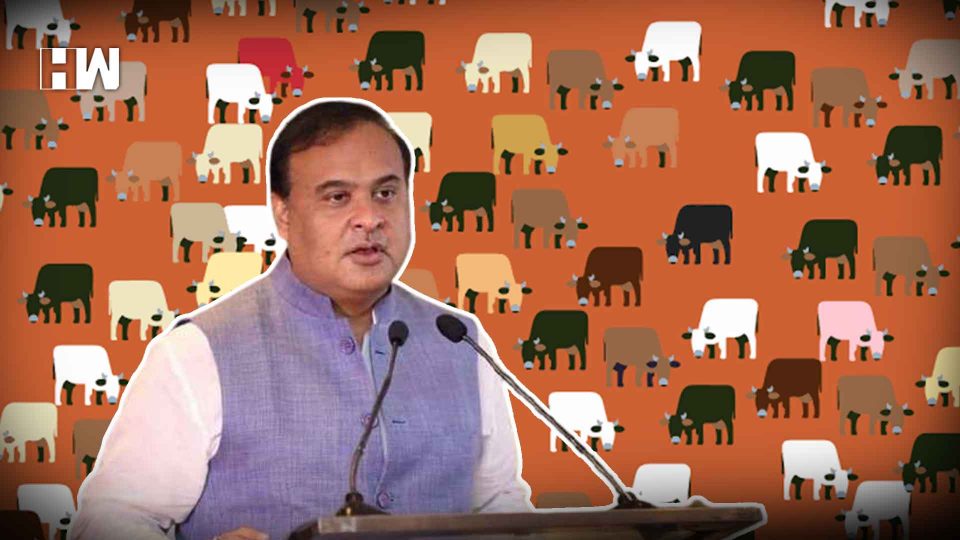Opposition Congress said there are a lot of problematic areas in the Bill and they are getting it examined by legal experts.
Assam Chief Minister Himanta Biswa Sarma on Monday tabled a new bill to protect cattle. This bill bars sale and purchase of beef or beef products in areas “predominantly inhabited by Hindu, Jain, Sikh and other non beef-eating communities”, or “within a radius of 5 km” of any temple or sattra (Vaishnavite monasteries).
This is a unique aspect of the The Assam Cattle Preservation Bill, 2021 compared to the similar laws brought in in other states. The new bill aims to regulate “slaughter, consumption, illegal transportation” of cattle. If passed, the Assam Cattle Preservation Act, 1950, which the State CM had earlier said lacked sufficient legal provisions to “regulate slaughter, consumption and transportation of cattle”, will be repealed.
Leader of the Opposition Debabrata Saikia of Congress, reacting to the bill, said there are a lot of problematic areas in the Bill and they are getting it examined by legal experts. “For example, the 5 km rule about beef. A stone can be laid and a ‘temple’ can be ‘built’ anywhere by anyone — so it becomes very ambiguous. This may lead to a lot of communal tension,” Mr Saikia said.
The opposition parties have maintained that they will push for amendments to the bill. Aminul Islam, All India United Democratic Front (AIUDF) legislator, said: “This is not a Bill to protect cows, or even respect cows. This has been brought to hurt the sentiments of the Muslims and polarise communities further. We oppose it and will try and bring in amendment resolutions.”
Though for purposes of the anti-slaughter Act, both Rajasthan and Madhya Pradesh include only cow progeny, Assam’s proposed law also does not distinguish between different cattle types — it will apply to all cattle that includes “bulls, bullocks, cows, heifer, calves, male and female buffaloes and buffalo calves.”
Without valid documents, the Bill prohibits inter-state transport of cattle to and from, as well as through Assam. The State CM had earlier said that the proposed legislation was to ban movement of cattle to check cattle smuggling to Bangladesh, which shares a 263-kilometre-long border with Assam. He said the 1950 Act lacked sufficient legal provisions to “regulate slaughter, consumption and transportation of cattle” and thus it was imperative to enact a new legislation.
Cattle slaughter, as per the 1950 Act, is allowed only for cattle “over 14 years of age” or those “unfit for work” in Assam subject to a “fit-for-slaughter certificate” issued by a local veterinary officer after examination. Under the new proposed law for Assam, the same approval certificate for all cattle is required. However, the bill adds that a cow cannot be slaughtered regardless of age.
“No certificate shall be issued unless the Veterinary Officer is of the opinion that the cattle, not being a cow, is over fourteen years of age; or the cattle, not being a cow, heifer or calf, has become permanently incapacitated from work or breeding due to accidental injury or deformity” it says.
‘Prohibition on transport of cattle’- the section 7 of the proposed law- states that without a valid permit, transport of cattle is banned from Assam to states where slaughter of cattle is not regulated by law, and from one state to another “through” Assam. It further adds that cattle cannot be transported within the state (inter-district), without documents.
The new bill also gives police officers (not below the rank of sub-inspector), or any other person authorised by the government, the power to “enter and inspect any premises” within their jurisdiction where he has “reason to believe that an offence under the Act has been or is likely to be committed.” In the earlier 1950 bill, this power was conferred upon only the Veterinary Officer and Certifying Officer, appointed by the government.
Persons found guilty under the proposed law can be jailed for a term of minimum three years (extendable up to eight years) and fined Rs 3 lakh (with the upper limit Rs 5 lakh), or both. The punishment will be doubled for repeat offenders.
The proposed law, however, allows for certain exemptions. The law won’t apply in case of “religious occasions” when “slaughter of cattle, not being a cow or heifer or calf” is allowed.
As an independent media platform, we do not take advertisements from governments and corporate houses. It is you, our readers, who have supported us on our journey to do honest and unbiased journalism. Please contribute, so that we can continue to do the same in future.

